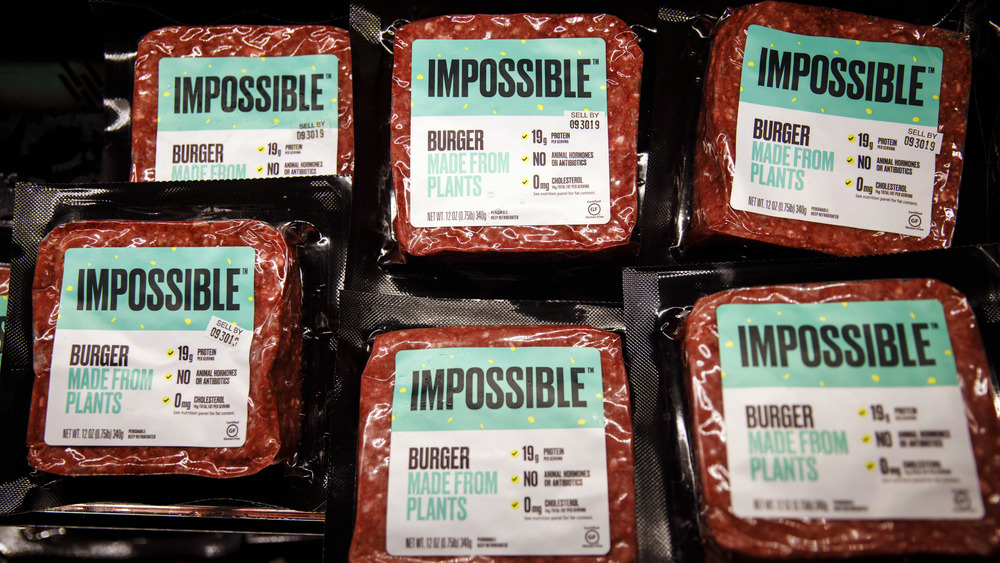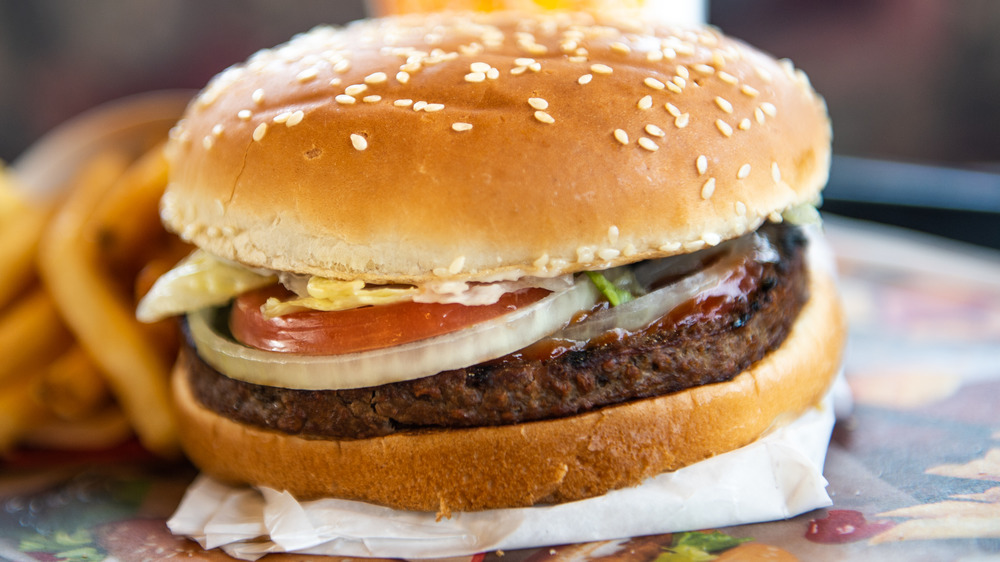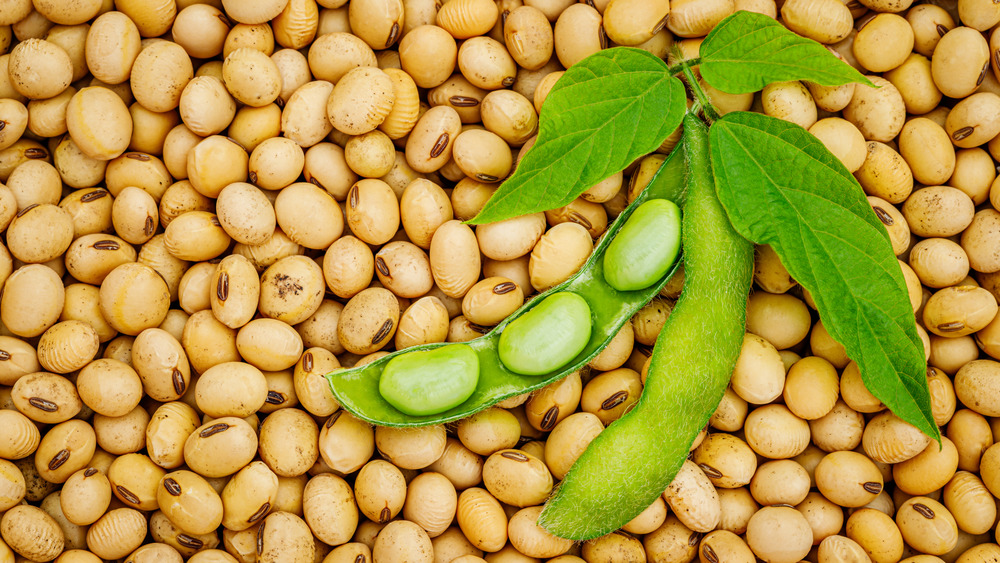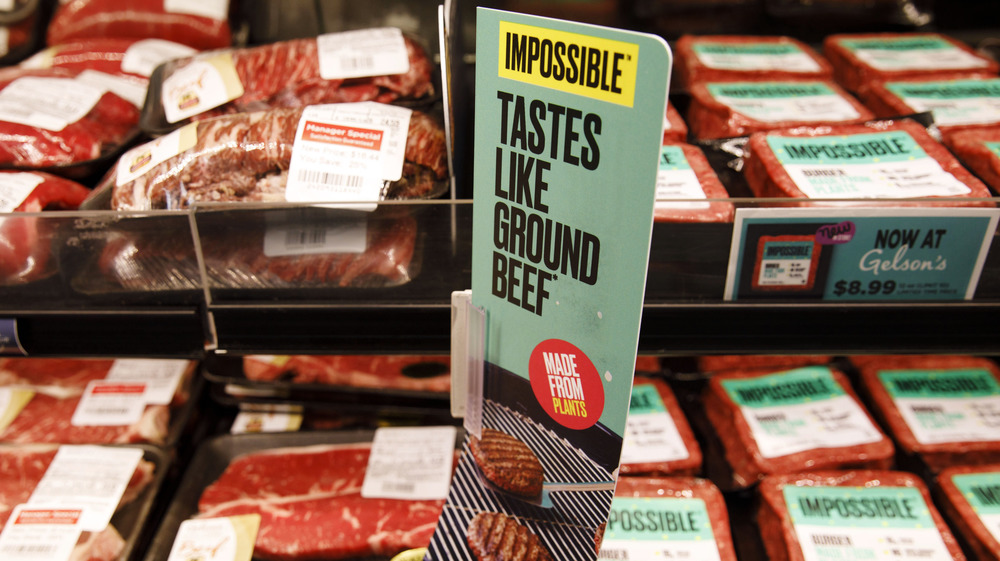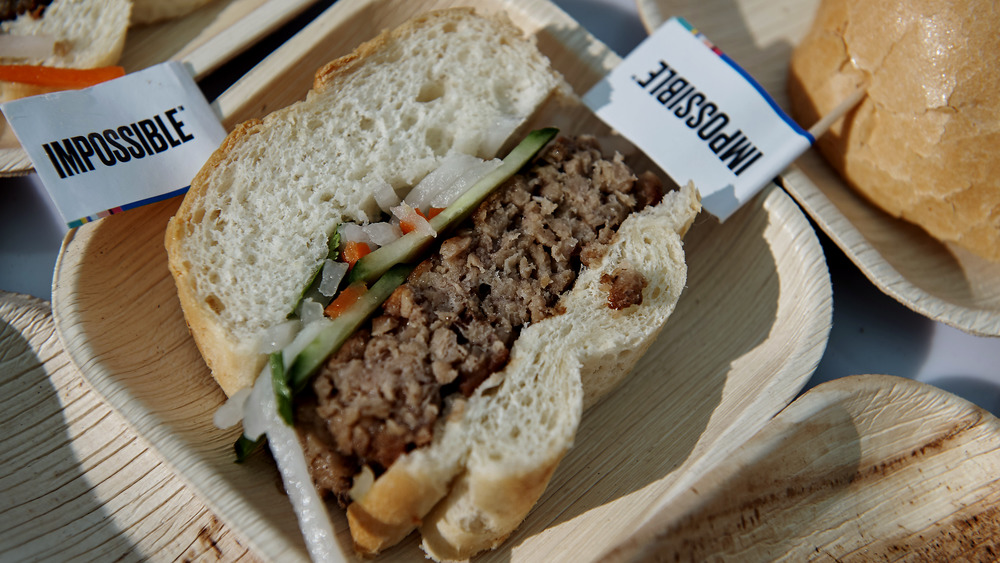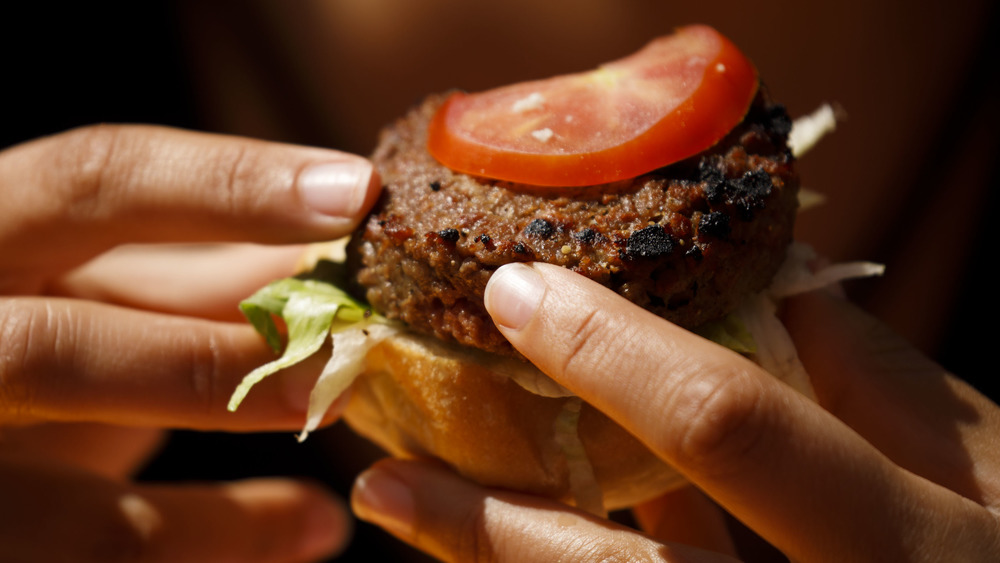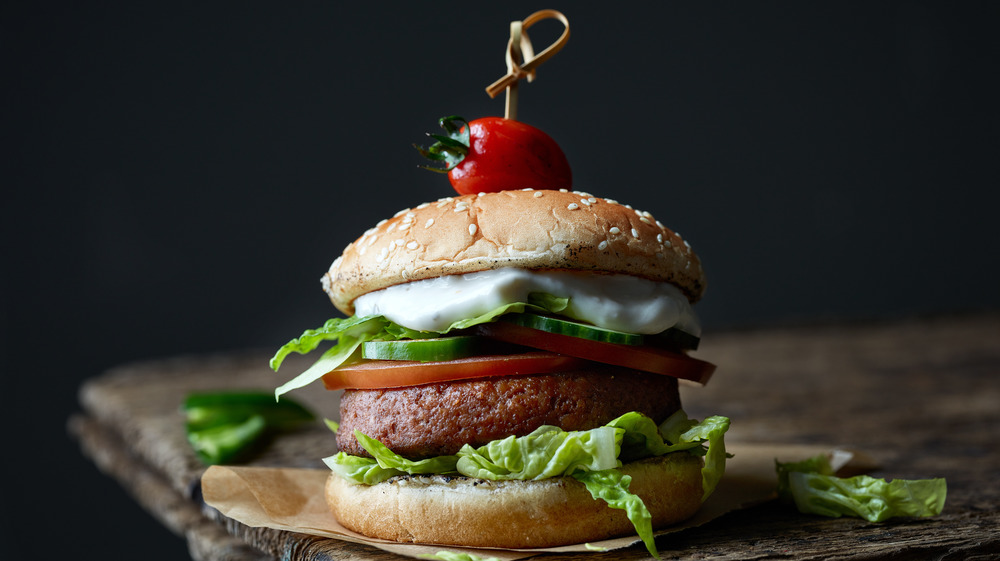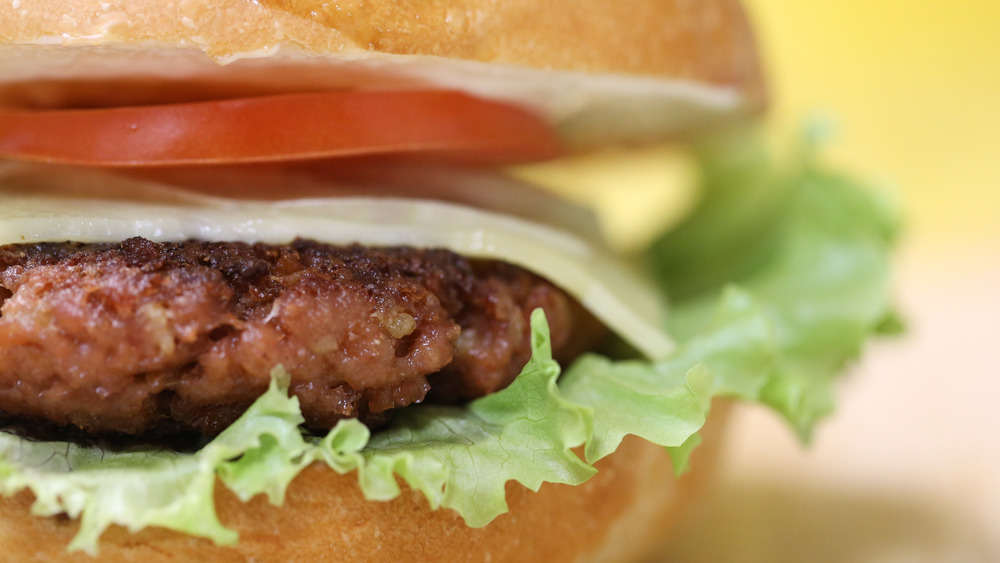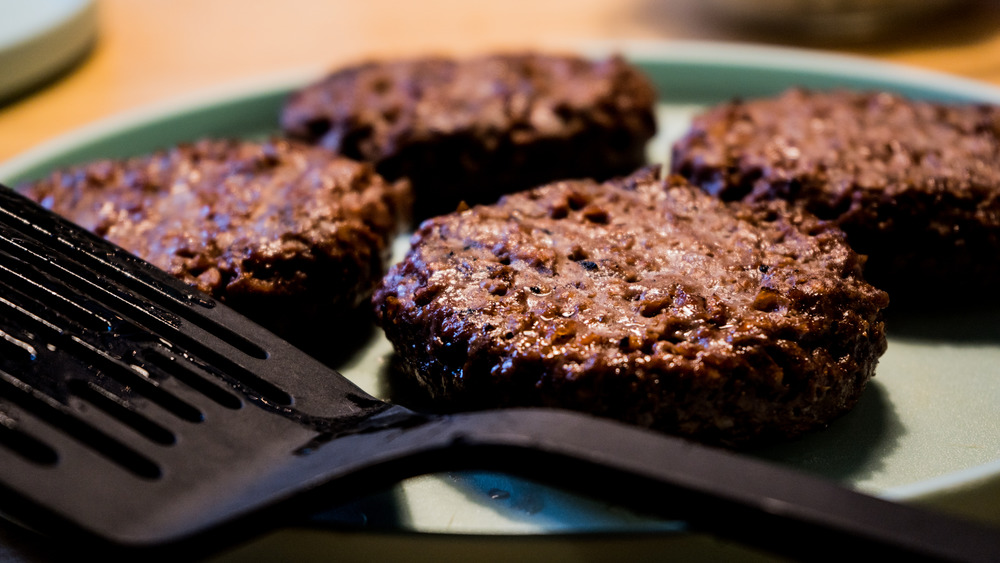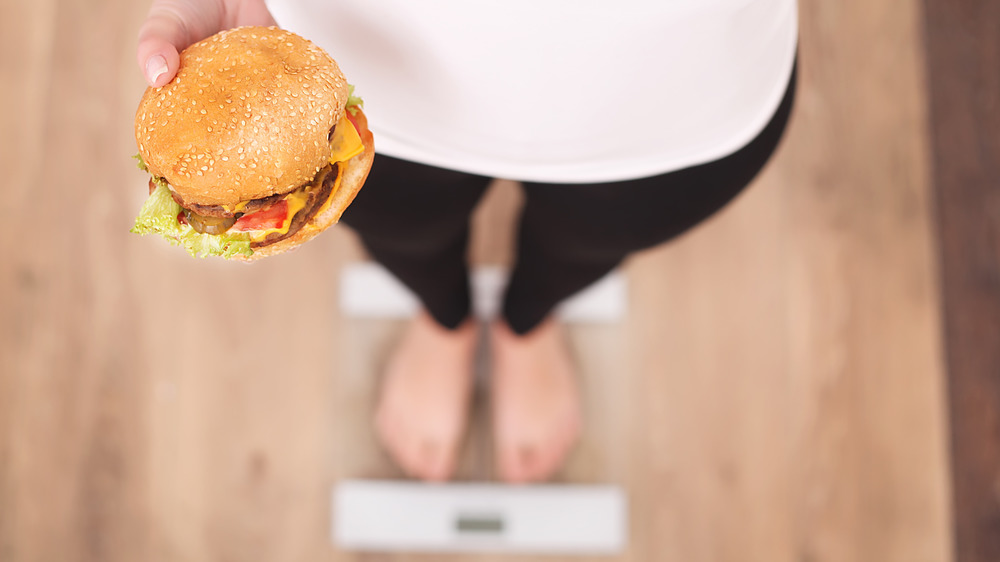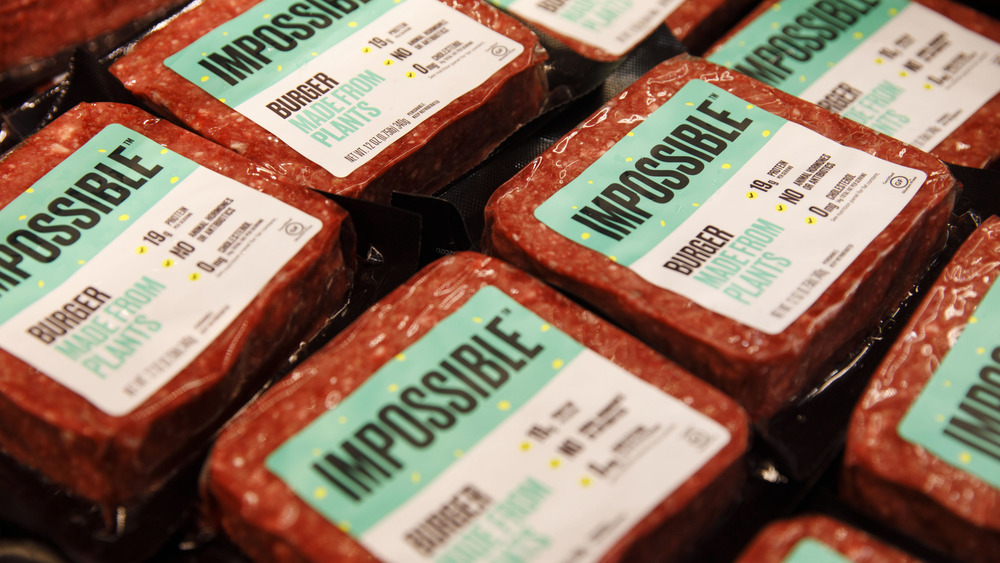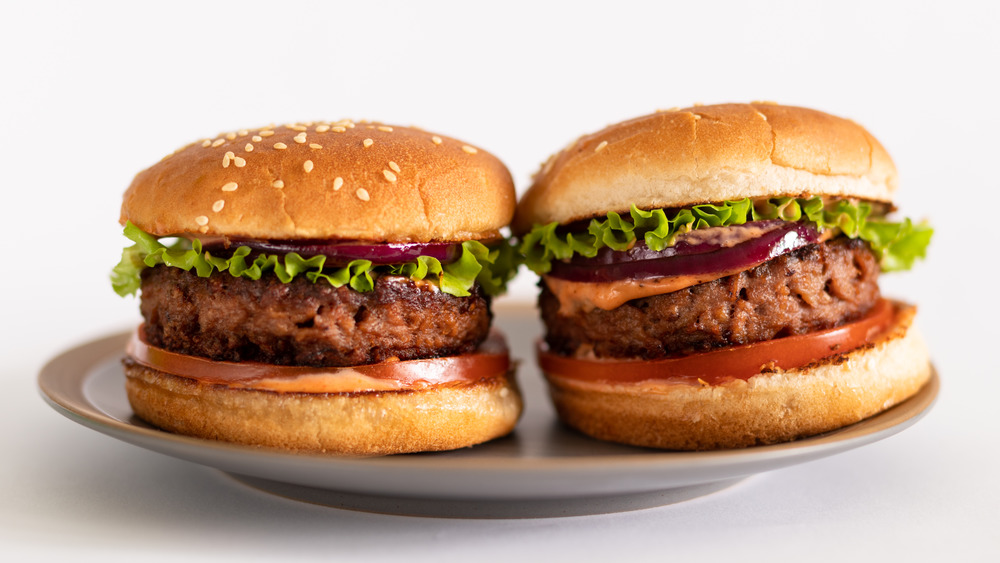When You Eat Impossible Meat Daily, This Is What Really Happens To Your Body
Impossible meat products are taking the world by storm, which is really further proof that a revolution is happening — and in your very own kitchen. With more and more people turning away from meat and embracing plant-based alternatives for beef and chicken, the non-meat market has exploded. And meat substitutes aren't just for vegetarians or vegans anymore — particularly when it comes to non-meat substitutes for products such as burgers.
According to data collected by The NPD Group, a market research firm, 89 percent of people who buy plant-based meat and dairy alternatives aren't doing it for any particular dietary imperative — they're just doing it because they want to switch it up (via NBC News). Before long, Impossible meat became one of the most visible players in this market, promising a burger that tastes and looks just like the real thing.
But if you pick up a pack of Impossible Burgers next time you're at the store, what would you be getting with each bite — and what would happen to your body if you ate the meat alternative every day? At Health Digest, we wanted to find out. Let's take a deep dive into the world of Impossible meat, and find out if it meats the standards of good health (sorry, we couldn't resist). Let's go!
You'll boost your vitamin intake when eating Impossible meat
With adequate vitamin intake being one of the most important aspects of maintaining good health, we want to know that what we're eating has the good stuff in it. Luckily, Impossible Foods has you covered on several fronts. The Impossible Burger comes with added levels of vitamins and minerals that are normally found in animal protein — including the all-important vitamin B12 and essential mineral zinc.
Both B12 and zinc can be difficult to obtain in adequate amounts on a strictly vegetarian or vegan diet (via Harvard Health Blog). With vitamin B12 vital for keeping our nerve and blood cells in good shape, according to the National Institutes of Health, and zinc important for immune function and growth and development, getting enough of both is crucial.
With Impossible meat containing other vitamins like niacin and riboflavin, it's clear that the creators have thought about the health qualities of their products. If eating it daily, it's useful to know that your body will still be getting a nutritional punch on the vitamin front.
You may consume too much saturated fat if you stick to eating Impossible meat
You might consider switching away from beef burgers as a step toward a lower-fat and healthier diet, and you'd generally be right — unless you're replacing them with Impossible products. Although Impossible meat doesn't contain animal fats, it still has a pretty high fat content — and that includes saturated fats (via Harvard Health Blog).
According to Harvard Health Blog, the difference in fat between an Impossible Burger and an 85 percent lean ground beef burger of the same size is minimal: A beef burger contains 17 grams of fat, while an Impossible Burger contains 14 grams. What's more concerning, though, is that the saturated fat content is higher in an Impossible Burger — at 8 grams per serving compared to a beef burger's 6 grams.
According to dietitians, this isn't great news. As Julieanna Hever, a plant-based dietitian and the author of Plant Based Nutrition (Idiot's Guides), said to CBNC, "They're not much healthier than a meat-based burger." She continued, saying, "I'm concerned about the saturated fat levels." Her concern is certainly warranted, as saturated fat has been linked with premature death (via The Nutrition Source).
You'll be getting more soy when eating Impossible meat, which can cause some reactions
If you're switching from beef to Impossible meat, you'll be replacing one form protein with another. As Impossible Foods revealed, the protein in the Impossible Burgers largely comes from soy. Soy is derived from soybeans and is commonly used as a source of protein in vegetarian and vegan diet plans (via Healthline).
If your body isn't used to eating soy — particularly in larger amounts, as you would be doing by eating Impossible Burgers daily — it might be worth keeping an eye out for any reactions. Soy consumption can occasionally side effects such as nausea, constipation, and bloating, and can in some cases cause allergic reactions like rashes, itchy skin, and even anaphylaxis (via WebMD).
It's worth pointing out that soy protein is generally safe to eat and causes no reactions in most people who consume it. Still, it's better to start slow, or consult with a healthcare professional before consuming it every day.
Your body might be less at risk of food poisoning when switching to Impossible meat
If you've ever spent an evening doubled over a toilet seat due to eating some questionable gas-station hot dogs (we're not saying we've done that...), you'll know how grim food poisoning can be. If you've traded out your meat products for Impossible meat every day, though, you may not have to worry about this as much.
Generally, food poisoning occurs in your body when you eat undercooked or improperly cooked food that has been contaminated by bacteria such as E. coli and Salmonella. The most likely sources of food to be contaminated are raw animal products, like raw or undercooked meat or poultry (via CDC). Food poisoning can range from loss of appetite and weakness to nausea, diarrhea, vomiting, and abdominal cramps, as Healthline explained.
If you're a frequent eater of meat, your risk of food poisoning is, naturally, higher. And, of course, by switching over to plant-based meat substitutes, like Impossible Burgers, you'd reduce your risk of food poisoning due to the lower likelihood of bacteria like E. coli and salmonella being present in the food. "If someone had concerns around the safety of consuming undercooked meat, especially if cooking equipment is lacking or the cleanliness of an operation is questionable, then the meat substitute might be the better choice," registered dietitian nutritionist Debbie Petitpain told Today's Dietitian.
You'll get a boost of fiber if you eat Impossible meat every day
Although beef burgers can be pretty darn delicious, they're generally pretty low in fiber. If you're eating red meat regularly this can, unfortunately, become pretty apparent through symptoms like constipation (via MedicineNet).
With diets higher in fiber helping to promote regular bowel movements and prevent constipation, as well as being associated with a lower risk of heart disease, according to The Nutrition Source, you'll be pleased to know that Impossible meat has a pretty great fiber content. Yes, eating it often means you'll be getting a good dose of what you need to keep you regular.
A 4-ounce Impossible Burger has 3 grams of fiber per serving, whereas a 4-ounce lean beef patty has 0 grams of fiber. With the recommended total dietary fiber intake being 25 to 30 grams from food sources, according to UCSF Health, that's about 11 percent of your daily intake in just one meatless burger. Not bad!
You might not get enough of this vitamin when switching to Impossible meat
Although red meat is primarily known for being high in B vitamins, zinc, and iron, one lesser-known vitamin that meat can supply your body with is vitamin K2. If you're switching from beef to eating Impossible meat on the reg, it's important to consider other ways to get this vitamin.
Vitamin K2 is particularly important for cardiovascular health and bone health, as it corrects calcium amounts in the body, as shown in a 2015 study published by Integrative Medicine: A Clinician's Journal. However, according to Today's Dietitian, deficiencies in K2 can be a fairly common occurrence. This isn't good news if you're switching from red meat to Impossible Burgers. As Healthline illustrated, Impossible Burgers don't contain vitamin K2, whereas beef burgers do.
Therefore, if you're making the switch, incorporate other dietary sources of vitamin K2 to make sure that you're getting the levels you need to keep your body functioning. Non-meat sources of foods like cheese, butter, and egg yolks contain levels of K2. If you're vegan or are looking to avoid animal products altogether, try sauerkraut or natto, as both are great sources of K2 (via WebMD).
Eating Impossible meat daily may raise your cholesterol
While Impossible meat could be a pretty tasty addition to your diet, you might not be too pleased with the saturated fat content. With 8 grams per serving (seemingly coming from coconut oil) in an Impossible Burger, according to The Washington Post, it's a hefty amount in one go — and it could be problematic for cholesterol levels.
According to Harvard Health, saturated fats can drive up cholesterol levels — particularly the "bad" LDL cholesterol, which can raise your chances of cardiovascular disease or stroke (via WebMD). If you're looking to watch your cholesterol levels, eating Impossible Burgers every day might not be the best choice.
It's not just Impossible Burgers that can do this, though. This is part of a wider trend among imitation meat and meat alternatives. As Julieanna Hever, a plant-based dietitian and the author of Plant Based Nutrition (Idiot's Guides), told CNBC, "For the first time in 14 years I'm having people come to me quite frequently with high cholesterol or can't lose weight or [they] gain weight while on a vegan diet because they're eating a lot of processed foods. They're being kind of masqueraded as health foods."
Impossible meat can help you build muscle
Although dialogue around building muscle is usually dominated by talk of protein-heavy diets, some meat substitutes are more than capable of supplying the nutrients your body needs to get stronger. A 4-ounce Impossible Burger contains 19 grams of protein, which makes it a great way to boost your intake. With protein being particularly important for muscle synthesis, the process by which your muscles repair and strengthen after exercise, Impossible Burgers can hold their own when it comes to supplying your body with what it requires for strength-building.
What's also important is the type of protein in the "meat." Impossible Burgers gets their protein from soy. And soy is an excellent source of amino acids, organic compounds that act as the building blocks of muscle, help reduce muscle breakdown, and help improve athletic performance (via WebMD).
Ryan D. Andrews, sports nutritionist and author of A Guide to Plant-based Eating, told Muscle & Fitness, "Soy is a dense source of amino acids that builds muscle just as well as meat." So if you're trying to get ripped, subbing out meat for Impossible Burgers daily might just help.
You'll probably be getting too much sodium if you eat Impossible meat daily
The Impossible Burger has been a hit as a meat alternative and embraced by people looking to reduce their red meat consumption — regular intake of which is associated with health issues such as cardiovascular disease, different types of cancers, diabetes, and early mortality, according to the National Institutes of Health.
It's important to remember, however, that despite the lack of red meat, Impossible meat products still have other high levels of ingredients which, when eaten daily, can be problematic for your health. This includes sodium, which when ingested in higher amounts regularly can lead to health complications and affect heart health, kidney health, and increase the risk of stroke (per Medical News Today).
One 4-ounce Impossible Burger contains 370 milligrams of sodium per serving, or 16 percent of the recommended daily value. According to Rachel Fine, a registered dietitian nutritionist and owner of To the Pointe Nutrition in New York City, that's a significant amount (via HuffPost). With sodium levels not generally recommended to exceed 1,500 milligrams per day, this product's sodium content is worth keeping in mind.
You won't lack iron when eating Impossible meat daily
When you think of iron, you may think of juicy, rare, red meat. The thought of replacing a well-known source of iron with a non-meat substitute might have you wondering how much iron you'll be missing out on. Interestingly, though, Impossible Burgers are actually higher in iron, gram by gram, than regular beef. According to Good Housekeeping's side-by-side nutritional analysis of a 4-ounce Impossible Burger and a 4-ounce regular beef patty, the non-meat version provided 25 percent of your recommended daily iron intake compared to beef's 17 percent.
The iron in the Impossible Burger comes from an iron-rich protein found in soy plants called "heme," or soy leghemoglobin — which is also, according to Impossible Foods, what makes the Impossible meat taste so much like regular meat.
When consumed, iron helps with red blood cell production and works to prevent anemia, which can impact our energy levels and immune system (via Medical News Today). If you've started replacing your regular beef burgers with Impossible Burgers, you won't have to worry about your iron intake.
You might think that you'd lose weight eating Impossible meat, but you may not
The link between following a vegetarian diet and weight loss and control has been well observed. As the Mayo Clinic explained, individuals who follow a vegetarian diet are "generally leaner" than omnivores, as they tend to eat more plant-based proteins and whole grains, which are filling and lower in fat.
By that token, eating Impossible meat makes sense: It's a plant-based protein, so it must be better for my waistline, right? Not necessarily. As the Mayo Clinic highlighted, many non-meat products can still contribute to weight gain. And one of these products is the Impossible Burger.
According to CNET, the nutritional composition of Impossible Burgers and lean beef burgers are pretty similar — with the Impossible Burger boasting more calories, carbs, and total and saturated fat. If you haven't started losing weight since switching from beef patties to Impossible Burgers, well, this explains why.
Eat Impossible meat every day and you may consume more additives than you realize
Impossible meat is considered processed food, which means it goes through a fair few stages before reaching your dinner table. This also means there are several additives in the product. Although not all processed foods are automatically bad for you, it's worth noting that the list of additives that end up in Impossible products is fairly extensive. And with about 20 ingredients going into an Impossible Burger, it's far from a whole food source.
Although food additives and ingredients are carefully regulated, the number of ingredients causes concern for Rachel Fine, a registered dietitian nutritionist and owner of To the Pointe Nutrition in New York City, who made the point that switching to plant-based foods to improve nutrition can sometimes be hampered by choosing heavily processed plant-based options.
As Fine told HuffPost, "One thing I always tell clients is when you're looking at plant-based foods, look for ingredients high on the list that are whole foods. The problem with a lot of additives is that we just don't know the long-term effects of them, whereas a beef burger could just be one ingredient: beef."
If you're switching from beef to Impossible meat, you'll be eating more carbs
Although eating Impossible meat daily means you're getting a fairly comparable nutritional profile to ground beef burgers, one slightly surprising aspect of Impossible Burgers is the carbohydrates they contain: 9 grams per serving (via Impossible Foods).
Although this isn't an enormous amount, it's need-to-know information for people monitoring their carb intake, like people with diabetes or individuals on the keto diet. With the keto diet, in particular, followers attempt to maintain an ultra-low-carb diet high in fats, which results in the body entering a state of ketosis, burning fat reserves as an energy source resulting in weight loss (via Eating Well). Any amount of carbohydrates needs to be monitored carefully to achieve the desired results.
One Impossible Burger doesn't necessarily mean a ruined diet, though. According to a medically reviewed article in Perfect Keto, "From a macronutrient standpoint, the Impossible Burger may not kick you out of ketosis. However, eating a couple of servings of fake meat products like this might."


